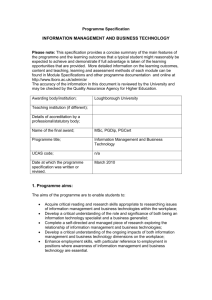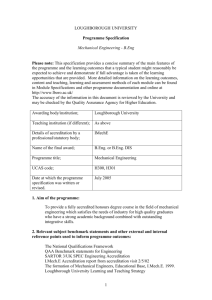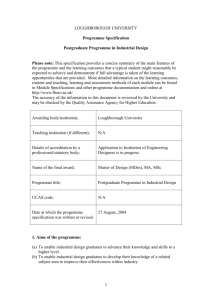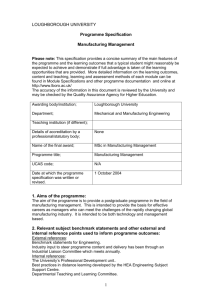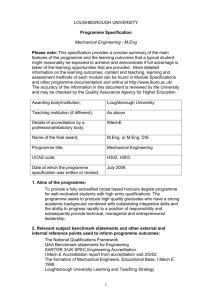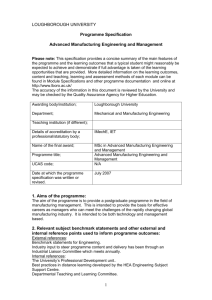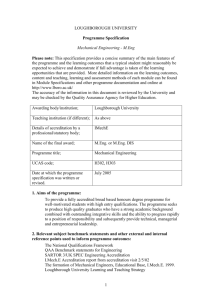Manufacturing Engine.. - Loughborough University
advertisement
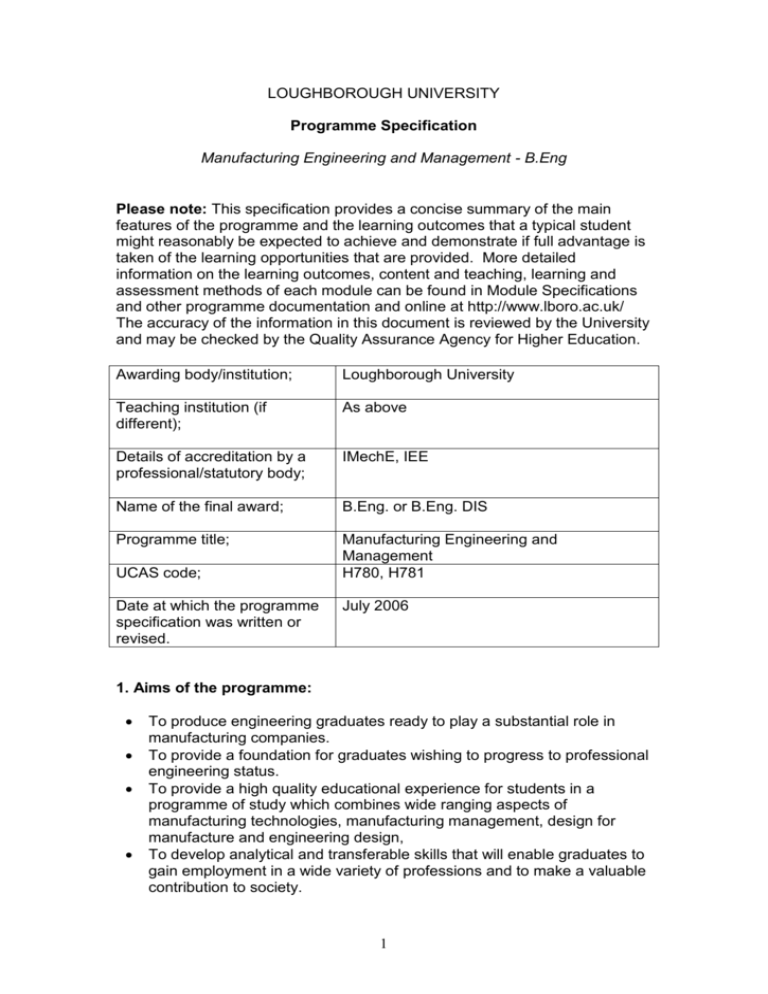
LOUGHBOROUGH UNIVERSITY Programme Specification Manufacturing Engineering and Management - B.Eng Please note: This specification provides a concise summary of the main features of the programme and the learning outcomes that a typical student might reasonably be expected to achieve and demonstrate if full advantage is taken of the learning opportunities that are provided. More detailed information on the learning outcomes, content and teaching, learning and assessment methods of each module can be found in Module Specifications and other programme documentation and online at http://www.lboro.ac.uk/ The accuracy of the information in this document is reviewed by the University and may be checked by the Quality Assurance Agency for Higher Education. Awarding body/institution; Loughborough University Teaching institution (if different); As above Details of accreditation by a professional/statutory body; IMechE, IEE Name of the final award; B.Eng. or B.Eng. DIS Programme title; Manufacturing Engineering and Management H780, H781 UCAS code; Date at which the programme specification was written or revised. July 2006 1. Aims of the programme: To produce engineering graduates ready to play a substantial role in manufacturing companies. To provide a foundation for graduates wishing to progress to professional engineering status. To provide a high quality educational experience for students in a programme of study which combines wide ranging aspects of manufacturing technologies, manufacturing management, design for manufacture and engineering design, To develop analytical and transferable skills that will enable graduates to gain employment in a wide variety of professions and to make a valuable contribution to society. 1 2. Relevant subject benchmark statements and other external and internal reference points used to inform programme outcomes: The National Qualifications Framework QAA Benchmark statements for Engineering SARTOR 3/UK SPEC Engineering Accreditation I.Mech.E Accreditation report from accreditation visit 7/11/2000 Loughborough University Learning and Teaching Strategy 3. Intended Learning Outcomes On completion of the programme, students will have acquired a broad base of engineering knowledge and skills, necessary to tackle modern manufacturing challenges and contribute to wealth creation. The programme provides a thorough understanding of manufacturing processes, manufacturing technologies and organisational principles alongside an understanding of operational principles, business processes and human management issues. Graduates should be self reliant and able to contribute well in team situations and will have gained the technical ability and commercial awareness to be able to work in both industrial and research environments. More specifically they will have: Knowledge and Understanding of: the underpinning science, mathematics and other disciplines associated with a career in manufacturing engineering. engineering principles, quantitative methods, mathematical and computer models. codes of practice, industry standards and quality issues applicable to a career in manufacturing engineering. management techniques appropriate for a career in manufacturing engineering and an understanding of the commercial and economic context of an engineering business. the nature of intellectual property issues and of environmental, legal and ethical issues within the modern industrial world. the characteristics of engineering materials, equipment and processes and an awareness of basic mechanical workshop practices. Skills and other Attributes: The skill to identify and define a manufacturing related problem and generate innovative solutions together with the ability to apply appropriate methods to model and assess such solutions. An ability to manage manufacturing related design process taking account of customer constraints such as cost, health and safety and risk within an engineering project. 2 Teaching, learning and assessment strategies to enable outcomes to be achieved and demonstrated: Acquisition of the above knowledge and understanding is through a combination of lectures, tutorials, seminars, group and individual projects, practical laboratory work, industrial training (DIS students only) and coursework. Assessment is through a combination of written examinations and assessed coursework. Coursework assessment varies from module to module and includes evaluation of laboratory reports, technical reports, problem solving exercises, oral presentations, product designs and prototypes 4. Programme structures and requirements, levels, modules, credits and awards: The programme is offered as full-time 3 year course leading to the award of BEng (Hons) or a 4 year sandwich course (the third year being spent in industry), and leading to a BEng (Hons) with a Diploma in Industrial Studies. The course is taught in 2 x 15 week semesters per year, weeks 13-15 being assessment weeks at the end of each semester. The programme structure is briefly described below and, in more detail in the Programme Regulations. Details of Module Specifications can be found at the following Web address:http://cisinfo.lboro.ac.uk:8081/ci/wr0015.main for them, e.g. modules based in the School of Mechanical and Manufacturing Engineering are coded MM (previously MU = Manufacturing Engineering, MC = Mechanical Engineering). The credit weighting of each module is specified, 10 credits being equivalent to 100 hours, on average, of student effort. Part A Compulsory Modules (120) Mathematics (20) Engineering Science (20) Manufacturing Processes and Materials (20) Manufacturing Design 1 (10) Manufacturing Technology, Systems and Management (10) Integrating Studies 1a (10) Electronics and Electrical Technology 1 (10) Integrating Studies 1b (10) 3 Part B Compulsory Modules (120) Engineering Science and Modelling (20) Manufacturing Processes and Technology (20) Integrating Studies 2 (20) Manufacturing Design 2 (10) Engineering Computing (10) Engineering Product Design (10) Manufacturing Planning and Control (10) Statistics (10) Engineering Management (10) DIS/DINTS (Optional) Our accredited industrial placement scheme leads to the additional award of Diploma of Industrial Studies. Alternatively, students may take an integrated year of study and training abroad in co-operation with a partner university, leading to the award of Diploma of International Studies. Part C Compulsory Modules (60) Individual Project (30) Business Systems (10) Management of the Human Resource (10) Manufacturing for the Environment (10) Optional Modules (20 from Group A) Project Management (10) Electronic Product Design (10) Industrial Polymers (10) Operations and Distribution Management (10) Metrology (10) (20 from Group B) Design for Assembly (10) Fundamentals of Marketing (10) Advanced Manufacturing Processes & Technology 1 (10) Digital Image Processing (10) Sports Engineering (10) Healthcare Engineering (10) (20 from Group C) Advanced Electronics and Electrical Technology (10) Robotics, Automation and Control (10) Rapid Prototyping (10) Polymer Processing (10) Finite Element Analysis 1 (10) Computer Aided Design (10) 4 Study Abroad Within the Academic Year Students may make arrangements to study at an approved overseas institution for one semester in part C. 5. Criteria for admission to the programme: Candidates must be able to satisfy the general requirements of the University and of the School of Mechanical and Manufacturing Engineering; typically the requirements are: A Level Qualifications 260 points, including Maths/Physics or Maths/D&T at A-level, min C in Maths Vocational A level (VAL) 260 points from a minimum of 18 units, or 12 units plus A-level grade C BTEC entry to part A Pass overall, Merits in Maths and 3 Engineering Science subjects. BTEC entry to part B Pass overall, Distinctions in Maths and 4 Engineering Science subjects European Baccalaureate: 70% overall, min. 60% in Maths & Physics International Baccalaureate: 3 Higher Levels at 6,5,4. including Maths & Physics/D&T Scottish highers: 276 points (BBBCC) incl. Maths & Physics grade B Advanced highers: 260 points (BCC) incl. Maths & physics Irish: BBBCC incl. Maths & Physics Foundation: 100 credits + 45% min in MAF001 & MAF002 with aggregate score of 120 (55% average in Maths) 45% min in PHF110 & PHF210 with an aggregate score of 120 (55% in Physics) An overall year average of 55%+ Selection procedures Applicants are not formally interviewed. When we make an offer of a place we encourage candidates to visit the university to meet staff and current students and to tour the facilities. These can be one or two day's duration. Our special overnight visits which incorporate an informal interview have proved to be the best way to find out what living and studying in Loughborough is really like. 5 6. Information about assessment regulations: The method of assessment for each module is described within the relevant module specification (see section 4 above). Examinations are held in each subject for which an examination is required in the assessment period at the end of the semester in which it is taught. At the end of each year the results from examinations and coursework assessment will be combined, as detailed in each module specification. Percentage scores are calculated to one decimal place and then rounded to the nearest integer. The results for each module are compiled and considered by an examination board, which awards credit for each satisfactorily comp meet the assessment requirements of their programme regulations will be allowed to proceed to the next year of their course. Briefly, 100 credits are needed for progression in each year of a B.Eng degree however, in addition, this programme demands that students achieve a minimum standard of 30% in failed modules. This rule is applied to ensure that students are not permitted to skip modules on which later material may be based. Readers are directed to the programme regulations (attached) for full details of this and the criteria for the award of a degree. Candidates not meeting the criteria for progression will have the right to be re-assessed on one further occasion and, for Parts A and B of the course, this re-assessment may take place in the University’s Special Assessment Period in early September or in the next academic year. Re-assessment in the Special Assessment Period is not permitted for final year candidates or if less than 60 credits has been achieved. 7. Indicators of quality: The course is fully accredited by the Institutions of Mechanical Engineers and Electrical Engineers. In Teaching Quality Assessment, the Department was awarded 23 points out of a maximum of 24, confirming it as a leader in quality of teaching. In the last Research Assessment Exercise (RAE) we achieved a grade 5; the School is continually building on this achievement and is confident of improving its rating in the future. 6 8. Particular support for learning: Careers: The Wolfson School employs a full time officer to offer advice regarding careers and industrial placements. Also the University’s Careers Office run timetabled tutorial sessions within the programme’s curriculum. See also University’s Careers Service information: http://www.lboro.ac.uk/service/careers/section/careers_service/welcome.html Library: http://www.lboro.ac.uk/library/ Computing Facilities: The School has installed many computers to enhance the extensive central facilities provided by the Computing Services (see below). The additional facilities provided by the School fall into two general categories:Group 1 – Computing services primarily intended to support teaching activities. Access to these machines is limited only by timetabled teaching/tutorial requirements. Group 2 – Computers intended to support research in the School, but to which students have access whilst undertaking certain electives and/or by prior arrangement with their project supervisor. Group 1 The School has many PCs that are used to support its teaching activities by exposing students to relevant applications software. The largest concentration of these is in the PC Rooms TW/1/15 and T/2/10. All of these computers use Microsoft Windows NT. CAE Room (TW/1/14) houses Engineering Workstations that are used extensively to support CAD and CAE teaching. These workstations use the UNIX operating system with the Common Desktop Environment as windowing systems. A further substantial group of workstations and PCs have been installed in the Design Projects area as part of an Engineering Faculty initiative. Group 2 The majority of the computer based research in the School is done on similar Sun Microsystems and Windows NT workstations. Those students opting for projects closely allied to these research projects in their final year should therefore already be familiar with this type of facility. See also University’s Computing Services information: http://www.lboro.ac.uk/computing/index.html 7 Professional Development http://www.lboro.ac.uk/service/pd Counselling Service http://www.lboro.ac.uk/service/counselling Engineering Student Centre: http://engstudent.lboro.ac.uk English Language Study Unit: http://www.lboro.ac.uk/admin/elsu/index.htm The Mathematics Learning Support Centre: http://mlsc.lboro.ac.uk/ Disabilities & Additional Needs Service: http://www.lboro.ac.uk/disabilities/ Mental Health Support Service: http://www.lboro.ac.uk/disabilities/pages/mentalhealth-adviser.html 9. Methods for evaluating and improving the quality and standards of learning: http://www.lboro.ac.uk/admin/ar/policy/aqp/index.htm 8

